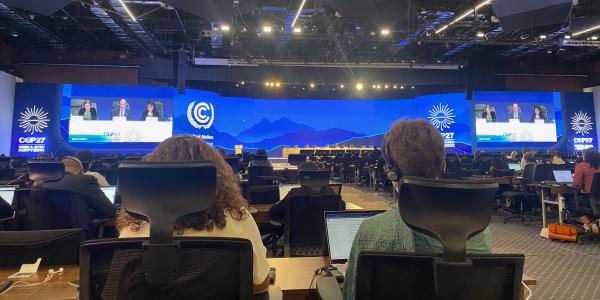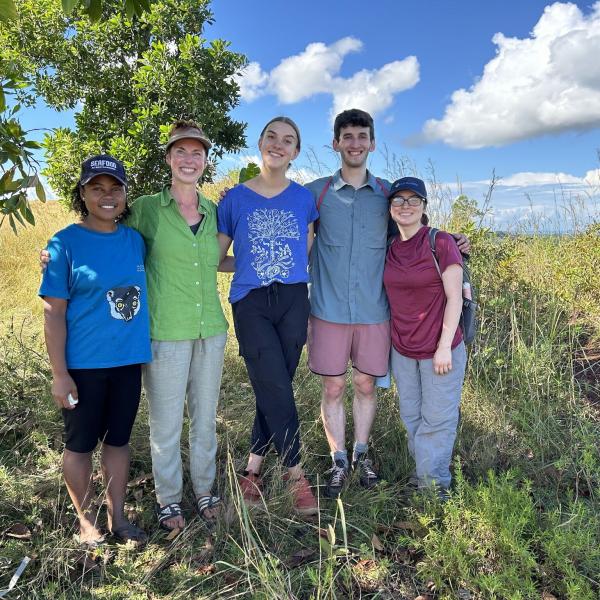Since 2011, Washington University students have attended the annual United Nations Conference of the Parties (COP) to learn more about the international climate negotiations. In November, they returned from Sharm El-Sheik, Egypt, with fresh insight into the global and interdisciplinary complexity of the crisis.
Each fall, students in Professor Beth Martin’s course “International Climate Negotiations” learn about climate change in a wide range of disciplines while also gaining rare access to international climate policy negotiations. Throughout the semester, students from across the university study the past 30 years of international climate policy in preparation for a life-changing opportunity: a trip to the United Nations climate change conference.
In November, students arrived in Sharm El-Sheikh, Egypt, for the 27th annual conference, known as COP27. They were each assigned a particular topic of negotiation to cover by sitting in on negotiations, attending informational side events, and networking with global leaders and diplomats.
“Being in that U.N. environment cemented a lot of the things we had learned in class,” said chemistry major Sabrina Hu, Class of 2023. “And it helped us develop our own perspectives on what we think is necessary going forward.”
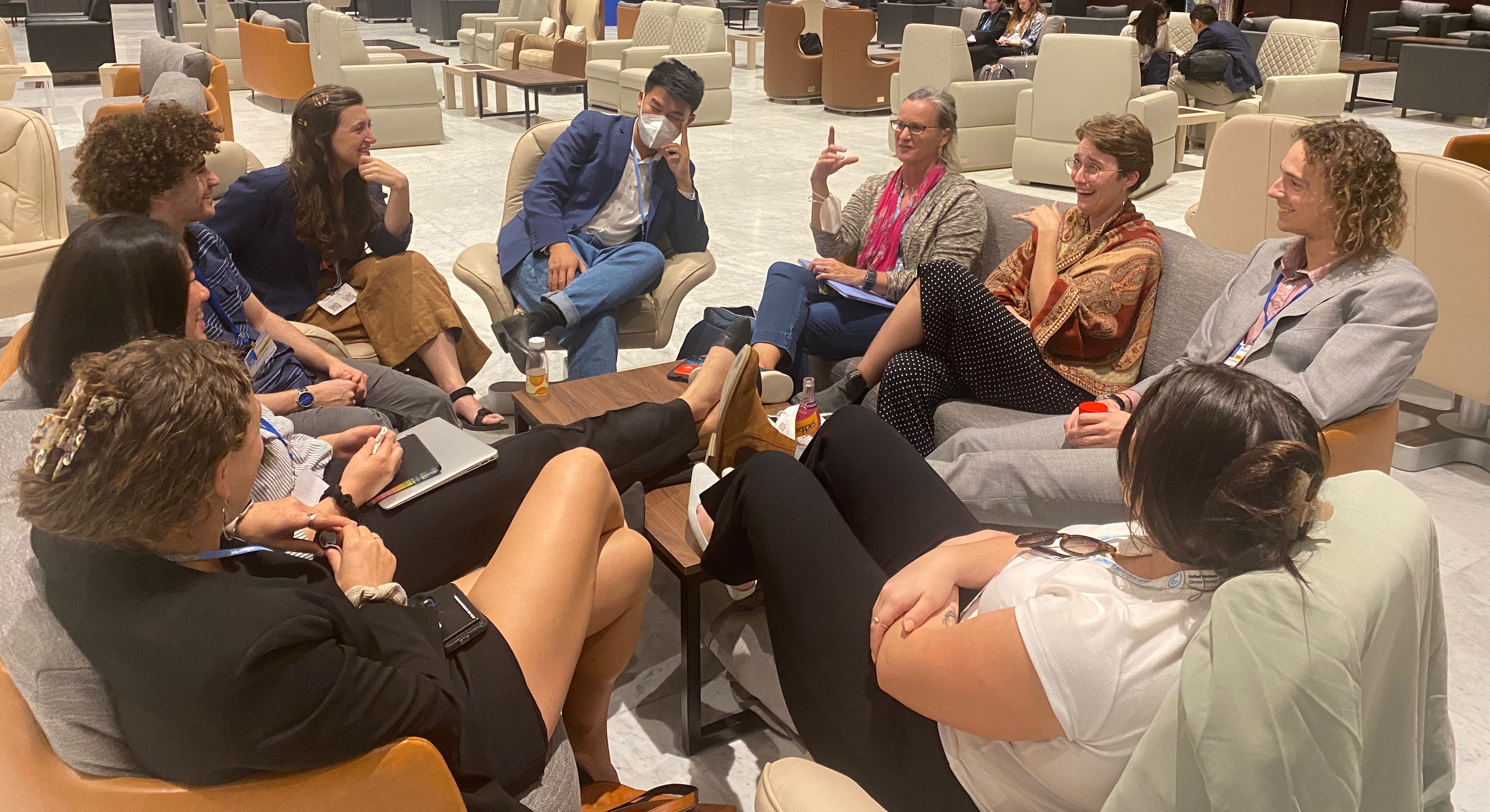
To share what they learned, students posted their observations of the conference on the Research and Independent NGO Constituency (RINGO) website. Here are some of their most impactful takeaways:
1. We must consult global, interdisciplinary perspectives to address climate change.
Martin, teaching professor in environmental studies and director of the Washington University Climate Change Program, designed the course to engage students from a wide range of disciplines in discussions about climate change. This academic year, students’ fields of study included political science, engineering, sociology, chemistry, environmental analysis, social policy, and business. For Hu, this interdisciplinarity permitted an expansive understanding of the issue.
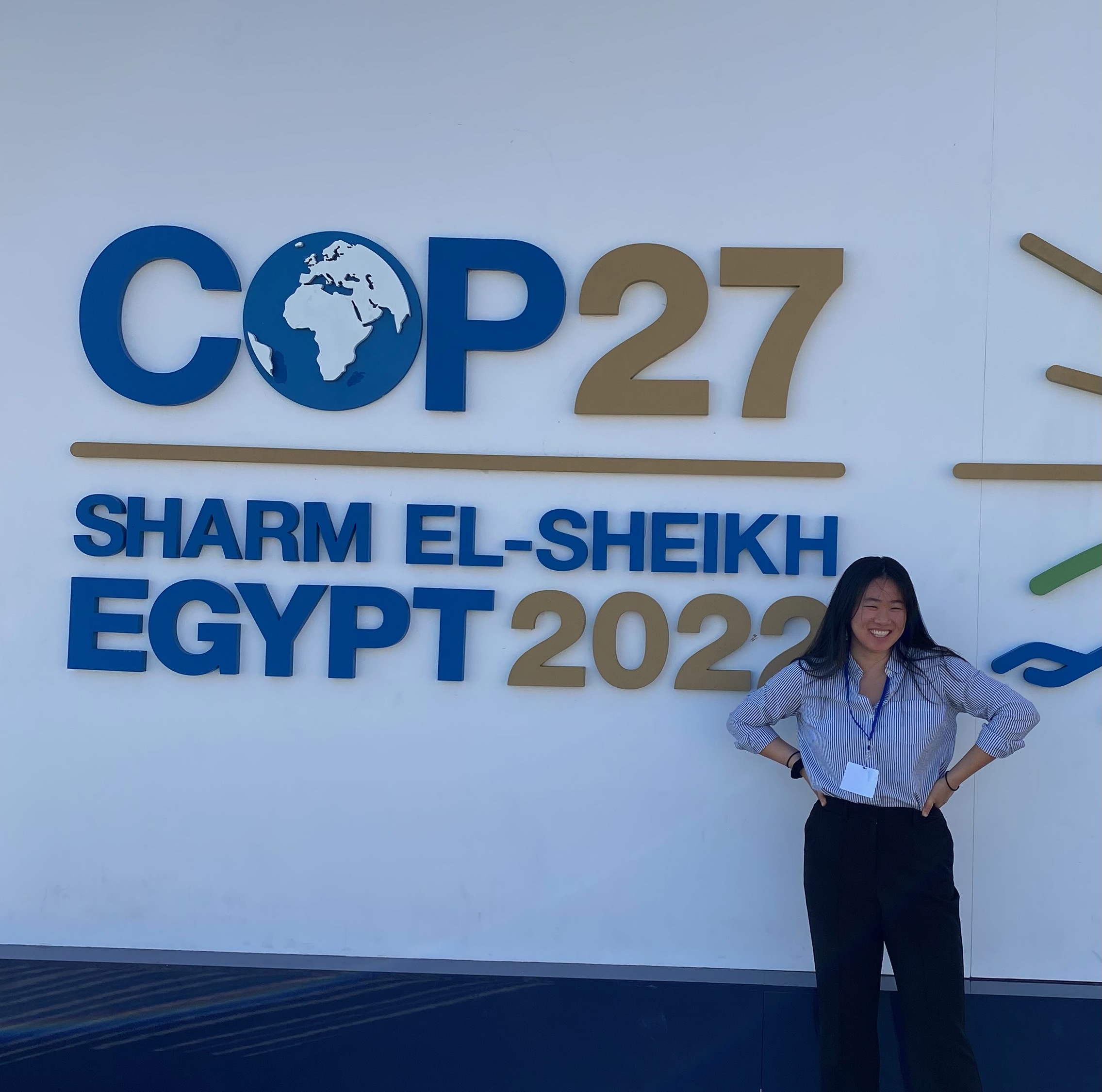
“Talking to students with more experience in the social, political, and economic fronts of climate change has helped me think more about the human impacts of the crisis,” said Hu.
Bea Addis, a graduate student in sociocultural anthropology and teaching assistant for Martin’s course, noted that the students demonstrated growth and humility as they navigated the global, interdisciplinary complexity of the topics they studied.
“As a result of hearing different disciplinary perspectives and then being at COP27, students learned just how complicated these issues are. They realized that climate change isn't a problem that America can just come in and solve; it’s intricately tied to cultural values and economic concerns across the globe,” said Addis. “Yes, we all need to contribute energy, enthusiasm, and effort. But we also need to collaborate and listen, with the understanding that we have a lot to learn.”
“We're not just one individual country; we’re a country within a global system,” said environmental analysis major Bennett Rosenberg, Class of 2023. For Rosenberg, meeting young people from developing nations made it especially difficult to ignore inequities between America and other countries. “Suddenly I’m hearing from a Nigerian boy whose backyard is a Shell oil drilling site. That made it a lot more personal. Americans don't know the ins and outs of how things are produced; we just buy things.”
2. The lack of progress on mitigation was disappointing.
To Rosenberg and Hu, the U.N.’s failure to make any progress on limiting fossil fuel use at the conference was a major disappointment. But understanding global inequities made it difficult to view this issue as completely black and white.
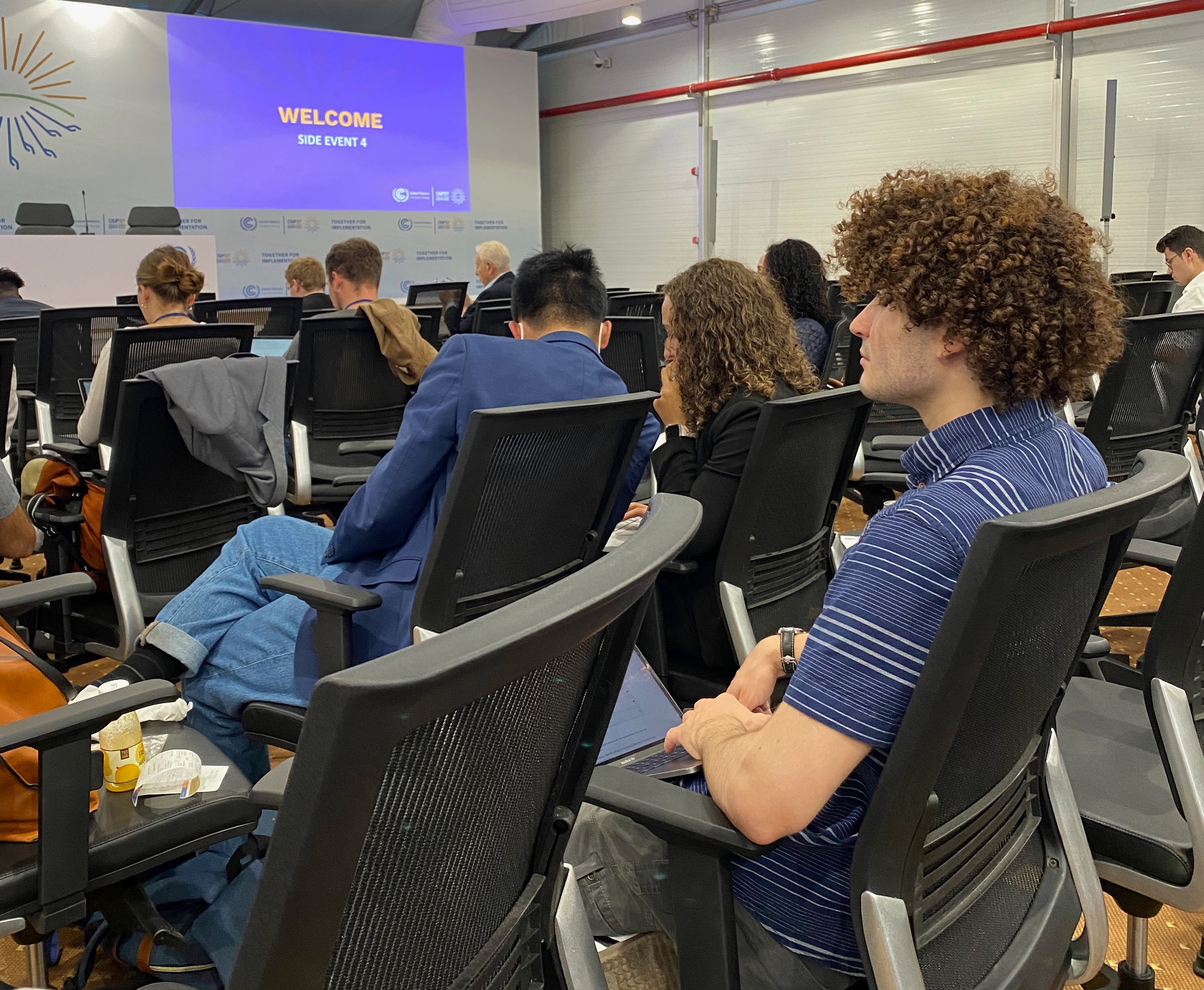
“Everyone knows how important it is to stop burning fossil fuels,” said Hu. “But at the same time, who is really willing to give up the security of knowing you'll have heat for the winter, or knowing you'll have electricity to power your homes? In developed countries, we have the privilege of just assuming that will always be there. But for people living in countries that don't have that sort of security, climate change may take a back seat to getting the basic necessities of life.”
At past COPs, developed countries pledged to fund strategies for global development which would limit fossil fuel use. According to statistics major Zainab Mairaj, Class of 2023, however, these promises are often not kept.
“As I was walking around the convention venue, I heard discussions about how developed countries had pledged all this money and made these commitments in the past but weren’t actually following through. That was a bit disheartening, but it made me realize the importance of local-level action.”
3. The U.S. was slow to accept responsibility for climate disasters in developing countries.
The most significant development of COP27 was the agreement reached on loss and damage, which Hu and Mairaj followed closely. “Loss and damage is an argument responding to the many climate events around the world that have led to devastating loss of life, property, and livelihoods,” Hu explained. “It argues that, in order to compensate for these losses, developed nations who have contributed most to emissions should pay ‘loss and damage,’ or compensation, to developing nations that are suffering these horrible events through no fault of their own.”
By pushing for a Loss and Damage Finance Facility, developing countries hoped to establish a fund they could use to recover from climate catastrophes. As Hu followed the negotiations, she learned more about the disasters already occurring in these countries.
“I attended a side event with panelists from Fiji, Bangladesh, and Syria. They spoke about the typhoons, flooding, and droughts they’ve been experiencing, and how they have displaced communities and ruined livelihoods,” said Hu. “These countries don't have a way to recover from such huge climate events without the help of developed nations.”
For Mairaj, it was interesting to follow these negotiations as an American, especially as the United States became the last holdout on establishing a Loss and Damage Finance Facility. “There were a lot of comments which suggested annoyance with the U.S. One issue was that developing countries did not want to have to provide accounts of how they spent loss and damage money, while the U.S. was demanding transparency.”
The U.S. was also hesitant on loss and damage because of the legal precedent it would set. “As the biggest historical emitter, they worried that this agreement would force them to admit liability for climate events across the globe, opening them up to lawsuits that they want to avoid at all costs,” said Hu.
4. Climate negotiators are people, too.
As meetings ran late and diplomats grew tired, the influence of external factors on negotiations became increasingly evident.
“The more time I've spent in the COP space, the more I realize the impact of its everyday realities on the people participating,” said Addis. “Even though it's incredibly bureaucratic and complicated, it’s still just humans in a room. And they cannot help but be impacted by the life around them.” As an example, Addis recounted how a small group of people supporting the indigenous peoples caucus, or IIPFCC, stayed up as negotiations on carbon markets went through the night, encouraging exhausted diplomats to stay strong in their support for indigenous peoples priorities. “They were thanking their allies and offering support, saying ‘Come on, this is important! We need you to do this for us.’”
In addition to encouragement, criticism was surprisingly effective in moving negotiators to action. As Rosenberg followed negotiations on the Koronivia Joint Work on Agriculture, he observed that India was the sole dissenter against the agreement until other countries expressed frustration with them for running the negotiations late. “They finally caved because everybody just wanted to go home.”
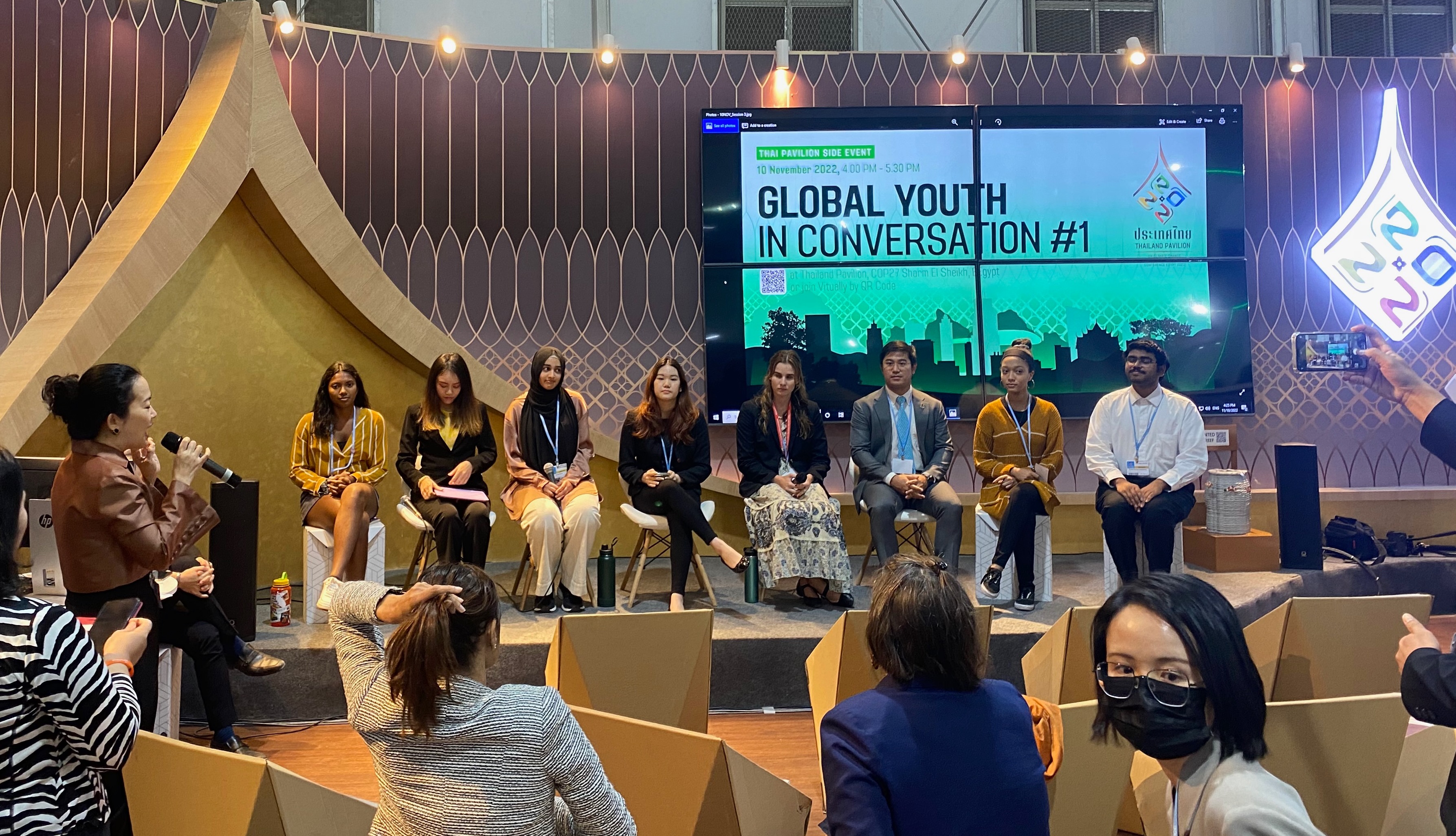
5. Unified advocacy was a gamechanger.
As a graduate student in anthropology, Addis conducted research in the Philippines with a young activist named Marinel Ubaldo, whose town was devastated by a typhoon. By the age of 16, Ubaldo was giving speeches at COP to encourage negotiators to act. “While her advocacy has made a huge impact, it's yet another unequal burden that she has had to relive her traumatic stories to raise awareness. It's exhausting, especially in a forum where progress is slow and activists often feel sidelined."
“I think that many of the negotiators are people who care about the climate and want to do something good, even if they're constrained in how they do that,” said Addis. “Sometimes, the firsthand account of someone directly impacted by climate change reminds them what they’re really doing.”
Ultimately, the unified advocacy of developing nations convinced the U.S. to accept the loss and damage agreement. “It was really exciting,” said Hu. “One day, while I was at lunch, I ended up sitting next to negotiators from Jamaica and Belize who had been fighting for loss and damage all week. I asked one of them if he would be willing to compromise and agree to a lesser financial mechanism rather than a fully-fledged fund, and he said, ‘Absolutely not.’ He said that the countries most impacted by climate events were standing firm, so his country was standing firm with them. And he could tell the U.S. was wavering.”
To Hu, this outcome reflects a growing, multidisciplinary understanding of the severe impacts of climate change on developing nations. “It's really important for Americans to have an idea of how badly this is affecting other people around the world. I think that sort of global education is something that our generation takes a lot more seriously, and climate change is the defining issue of our generation,” said Hu. “Regardless of what you’re studying, there’s a role for everyone in making the changes we hope to see.”
Student delegates to COP27 included: Ganesh Chelluboyina (graduate student, McKelvey School of Engineering); Allison Fabrizio (Environmental Analysis, Arts & Sciences); Dylan Fernholz-Hartman (Applied Science, McKelvey School of Engineering); Sabrina Hu (Biochemistry and History, Arts & Sciences); Abigail Hunt (graduate student, School of Law); Nina Lukow (graduate student, Brown School); Shira Lyss-Loren (Sociology and Environmental Policy, Arts & Sciences); Zainab Mairaj (Environmental Analysis and Statistics, Arts & Sciences); Ranen Miao (Political Science, Sociology, and WGSS, Arts & Sciences); Sejal Rajamani (Environmental Biology, Arts & Sciences); Anna Riek (Organization and Strategic Management, Olin Business School, and Germanic Languages and Literatures, Arts & Sciences); Bennett Rosenberg (Environmental Analysis, Arts & Sciences); and Kyra Ruben (Global Cultural Studies, Arts & Sciences). For more information about the climate negotiations, visit https://sites.wustl.edu/wustlcop/. The WashU delegation receives support from Environmental Studies, the Climate Change Program, and the International Center for Energy, Environment and Sustainability.
